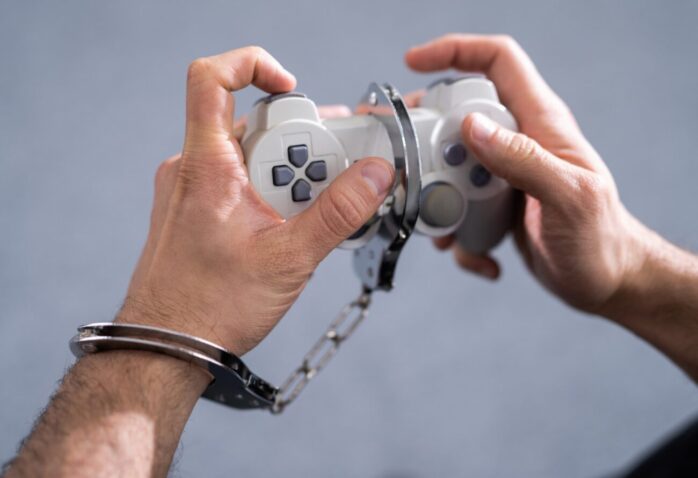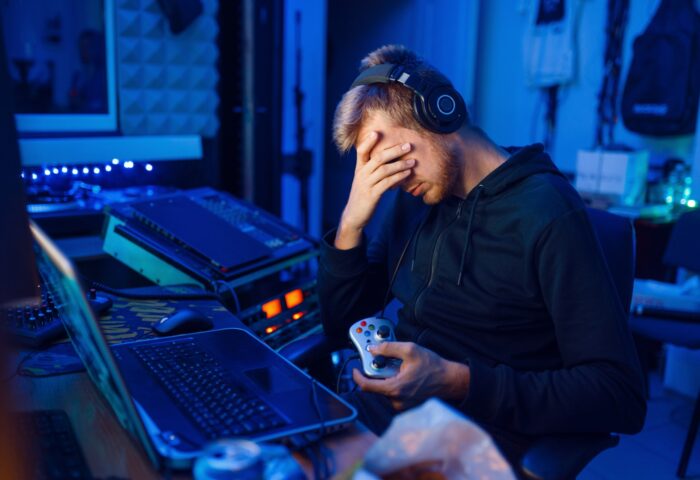
You might have heard people referring to video games as the new “drugs” because of the rampant addiction cases across the globe. The World Health Organization officially classified “Gaming Disorder” as a mental illness in 2019 and was formally included in the International Classification of Diseases in 2022.
It is tragic that mental health professionals had previously not paid attention to gaming addiction, like substance abuse. Even now, with more prevalent cases, some people don’t think it is possible to be a game addict, or rather, they don’t consider gaming disorder valid.
Numerous excellent publications and studies into Gaming addiction statistics, characteristics, and prevalence rates give us an invaluable understanding of the issue’s scope, despite having little information about the disorder. According to a post on Fotolog’s page, some of the signs of video game and screen addiction include;

- Always or frequently having thoughts related to gaming
- Feeling awful if you can’t play
- Feeling awful if you can’t play
- Being unable to reduce your playtime.
- Gaming when you are not supposed to like at work or school.
- Lying that you spend less time playing when you can be on the screen for almost a day.
- Depending on video games to improve emotions and mood.
A survey of screen addiction trends showed that 25% of people across the globe enjoy playing video games from time to time. This is estimated at around 2 billion people, which is expected to exceed 3 billion by 2024. Of this number, 3-4% of gamers are addicted to video games.
“You will realize millions of people are silently or unknowingly suffering from gaming problems if you look at it closely,” says Gitnux’s data analyst. “This indicates that the number of gamers with gaming addiction will likewise increase annually. Many gamers have shared their addiction situations with us over the past ten years, and they have encouraged one another to get better.”
This premise is backed by a 2021 research study and meta-analysis 2 that determined how 3.05% of people worldwide have gaming disorder. That implies there may be up to 60 million people—or even more—with the disorder mainly consisting of the youth.
It is important to acknowledge that gaming addiction exists, and the effects can be dire. Like substance abuse and gambling, gaming addiction can cause depression, anxiety, diminished self-growth, sleep disorder and many other adverse effects. But the good news is you can get better if you are intentional with beating the addiction.

What Causes Video Game Addiction?
Researchers have not yet pinpointed the precise reason behind internet and video game addiction as well as the compulsive properties of video games. As of now, scientists believe that winning video games may cause dopamine to be released. Dopamine is a neurotransmitter in the brain that is important for several body processes, including desire and rewarding pleasure. It is the same neurotransmitter that plays a role in several use disorders, such as addiction to drugs and gambling disorders.
Recent neurological studies have revealed parallels between the brains of those who suffer from addiction to drugs and video game disorder. A lot of dopamine is released when people with gaming addiction engage in the activity, which makes them feel better—especially if they win the game. The desire to get this feeling might be the biggest contributor to video game addiction. More studies are underway to determine the actual cause.

Is Video Game Addiction Diagnosed in Hospital?
Most people might be suffering from video gaming disorder but aren’t aware of it. The only way to tell whether you have the disorder is by visiting a specialist who can diagnose the illness. Your doctor can suggest that you see a psychologist or psychiatrist for a diagnosis of video game addiction to ascertain where you lie.
The Diagnostic and Statistical Manual of Mental Disorders, Fifth Edition of the American Psychiatric Association, has data regarding video gaming illness and is used by psychiatrists and psychologists to evaluate mental illnesses. The mental health specialist will inquire about your health-related and personal histories, gaming habits, and other details that might be conclusive.
In principle, severe gaming behavioral traits that seriously impede your ability to operate in your private, familial, social, academic, and/or professional spheres are required for the diagnosis of video gaming disorder. Typically, these behaviors must be recurrent for a long time, usually a year.

Is there Treatment for those Diagnosed with the Disorder?
Currently, not much has been unraveled about the disorder explaining why the treatment options are limited. The main treatment that seems to work on people with video game disorder is psychotherapy. This is where the addict engages in talk therapy sessions with a specialist.
The word “psychotherapy” refers to a range of therapeutic methods designed to assist you in identifying and dealing with empty feelings, attitudes, and conduct. Talking to a mental health specialist can give you and your family what you need to beat the addiction, including support, knowledge, and direction.
Some of the psychotherapy types your specialist might get you into include;
- Group Therapy – any type of addiction can be treated through group therapy sessions. For video game addicts, it becomes a valuable motivation source as they hear other people’s experiences and how they battle their addictions. Group therapy might have a more positive impact than other types of psychotherapy because of the sharing factor.
- Cognitive Behavioral Therapy – This is where you have one-on-one sessions with your therapist, who helps you identify and understand how your thoughts impact your actions. The method is very aggressive and usually has a goal at the end of the day. Your therapist might sometimes give you assignments and challenge you to unlock stages and feelings you never thought contributed to your addiction.
- Family Therapy – It is not unusual to find people in a marriage battling gaming addiction, mostly men. Gaming addiction can ruin your marriage as you will neglect your duties as the man of the family. In such cases, couples are advised to opt for family therapy as they both learn how to help the addict fight the problem.
Treating gaming addiction might not be a seamless process, but if you are intentional with the healing, you can do it. You can also tell your close friends and family about it so they can offer their support during this time.







